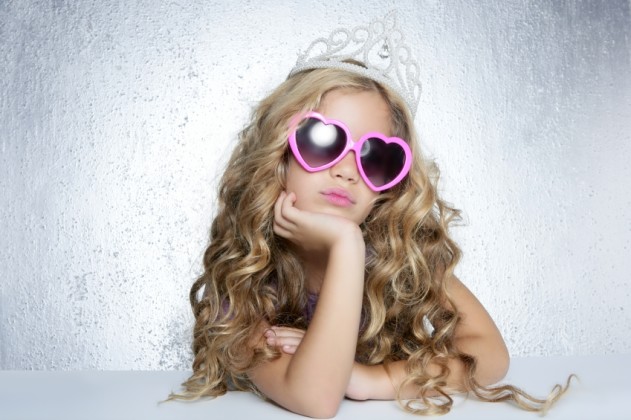I tried—really tried—to shield her from corporate culture and feminine stereotypes.
As a post-modern feminist progressive liberal parent, I was supposed to be the kind of woman who spawned a gender-neutral, omni-racial child. When I was pregnant, my prevailing philosophy was that gender was a construct created by social convention, and I was convinced my child would transcend the imposed definitions of femininity or masculinity.
When I gave birth to my daughter I dressed her in taupe, gave her non-specific wooden toys whittled by elves, and kept her away from any media that insisted girlhood is outlined by a particular definition.
I sent my child to a hippy wholesome Waldorf school where she spent her days identifying types of bark. I limited her screen time and tried to introduce a variety of stimuli that avoided all platforms of stereotypes.
But you know something? My daughter still got into everything pink, and everything princess.
It was unavoidable. I tried. Oh god, did I try. But unless I was going to move to an intentional community and live in a geodesic dome off the grid, chances were my kid would at some point be exposed to American culture at large. I made a true effort to avoid indoctrinating her with conventional feminine interests, yet despite my insistence that girls could play with trucks, my daughter formed her own preferences to everything Disney Princess.
After a while I gave up. My house now looks like Disney has had explosive diarrhea all over it. Frozen dresses, Little Mermaid Barbies, and an endless array of sweatshop-produced plastic toys litter every room. I tried to direct her attention toward goddesses and priestesses from ancient times, but my daughter’s opinion was clear: Princesses were the shit, and she wanted to be one. How could Kali compete with the million-dollar propaganda machine of the Disney empire? Maybe if there were an Artemis cartoon and sexy action doll to go along with it, I would have an easier time selling her value?
I am not alone in suffering through this pandemic. Lots of my friends who eat only biodynamic berries harvested in the moonlight, wear flowing organic clothes that were gifted to them at Burning Man, and say phrases like “paradigm shift” in everyday conversations are experiencing the same thing with their daughters. Despite their intentions to raise children free of big business stimulus, their kids are still captivated by the corporate cacophony of commercialism.
It’s not like my kid has a gun to my head and is forcing me to buy her this stuff. I know I could deny her and insist she follow my moral compass. I do my best to have limits and standards. But kids are intense. When they want something from you, they will wear you down like no other. The CIA could learn a lot from a 5-year-old when it comes to interrogation strategies.
Since I had already allowed the princess paradigm to penetrate my daughter’s psyche (see what I did there, sneaking in the word paradigm?), I decided to ask her what it meant to be a princess.
“Well, princesses are kind. They’re always nice to everyone. They’re also ‘savers’—like how Belle from Beauty and the Beast saves her dad.”
I then had some of my mom friends ask their daughters why they loved princesses. One little girl loved Elsa from Frozen because she has “so many powers” and thinks Princess Sophia “says beautiful things to her sister.” Another little girl wanted to be a princess “to wear a crown, silly,” and because “they are not rude. Them nice.” My daughter’s best friend said she’s interested in princesses because it takes “true wisdom to be a royal princess.”
I was surprised by how interested these girls are in the ethics of princessdom. It almost seems like an innocent obsession if all of them talk about the kindness and character traits of princesses. Yet even though the girls genuinely care about the emotional qualities of their heroines, their vision is consequently manipulated by the aesthetic they are presented with.
The girls are acutely aware of princess fashion. They notice how the princesses wear fancy clothes, and have pretty faces with thin bodies. One little girl would practice walking like Elsa—who has a pretty major sway in the hips—and told her mom she wished she had a similar defined waist and body type. The princess look made an almost equal impact as the princess nature.
The princess personality isn’t the problem as much as the beauty standard she represents. I’m not saying we have to throw pimples on these dolls or give them greasy hair, but the uniform and precise attractiveness definitely seeps into their perceived value. If we want to raise women who believe their significance extends beyond their beauty, we can’t pump little girls with the message that goodness = extravagant dresses and a perfect physique.
Toni Nagy writes for Huffington Post, Salon, Thought Catalog, Hairpin, Do You Yoga, and Elephant Journal. She has her own blog, and is the host of a podcast.
This originally appeared on Alternet. Republished here with permission.
Related Links:

